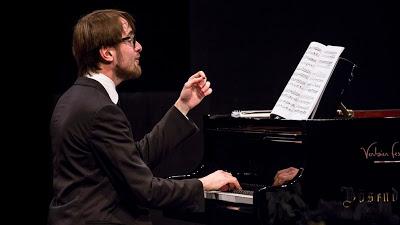by Paul J. Pelkonen

Daniil Trifonov in performance at the Verbier Festival.
Photo by Nicolas Brodard © 2016 The Verbier Festival.
He chose a program that reflected this newfound maturity. He opened with the Kinderszenen by Robert Schumann, a set of thirteen piano pieces that reflect on childhood as seen through an adult's eyes. He applied a newfound, gentle touch to these profound miniatures, mining them for poignant, proto-impressionist colors and showing the thematic relationships that Schumann inserted between each piece.
Next was the Schumann Toccatta, an early work that the composer wrote when he entertained ambitions being a concert pianist. It is not programmed much, as it's blazing, demanding stuff, built around powerful, repeated rhythms and requiring a stern and well disciplined technique. This work is the terror of many piansits but Mr. Trifonov dispatched it with ease, looking like he was having fun doing it.
The all-Schumann half of the evening ended with the Kreisleriana, a set of eight virtuoso fantasy pieces that were (with the Kinderszenen) an extended love letter to the composer's beloved Clara Wieck, later Clara Schumann. Mr. Trifonov's new-found sense of maturity served each of these works, from the tolling bell-like figures in the right hand to the dazzling lyric flights of fancy that shot through the most elaborate of these works.
Although Mr. Trifonov played these pieces with a sober artistic rigor, one sensed the maturity of expression as he touched each note. Schumann wrote some his most personal music here, and Mr. Trifonov showed understanding of the conflicting personalities and voices within the older composer's own writing. He also added the voice of his experiences in each note, the sound of the artist who is finding his independence and is able to brand each of these compositions with his own artisan's mark.
The second half opened with five selections from Dmitri Shostakovich's set of 24 Preludes and Fugues. These were created on the model of Bach's own Well-Tempered Clavier, but Shostakovich coded his works with moments of raw emotionality and expression of the dire state of affairs in 1950s Soviet Russia. This culminated in the final Prelude and Fugue in D minor, a cry from the heart that rent the still air of the concert hall with the anguish of another century.
The hero's journey ended in a blaze of virtuosity as Mr. Trifonov tackled the piano transcription of Three Pieces from Petrushka, the beloved Stravinsky ballet about a fairground puppet. This version of the work was a collaboration between the composer and Anton Rubinstein, transforming the charged Russian rhythms and complicated meters of the original ballet score into a workout for all ten fingers.
Mr. Trifonov gave an expressive performance, even rising off the bench to bang out the big climax of the Russian Dance, a moment that brought laughter from the house. He followed this bit of show with two encores: piano Fairy Tales by the underrated Russian composer Nikolai Medtner. After the second of these, he bowed to the audience and emphatically closed the lid of the concert Steinway. His journey was now complete.

